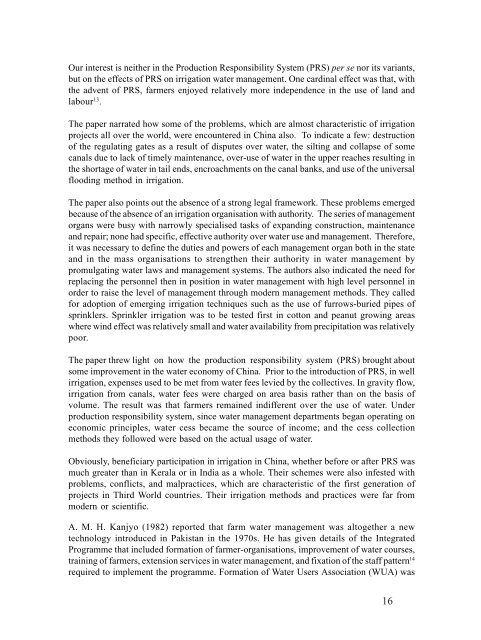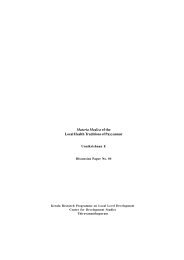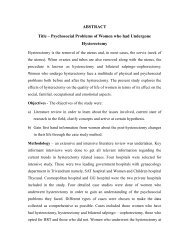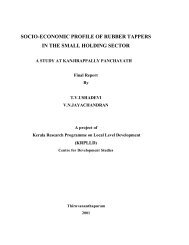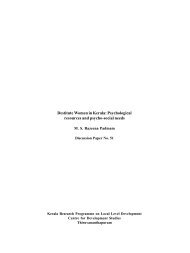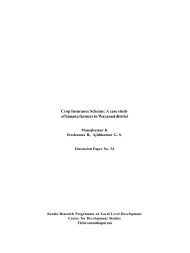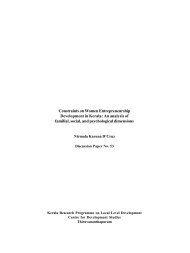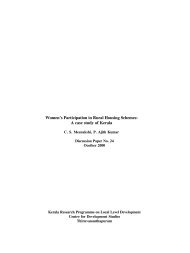Beneficiary Participation in Irrigation Water Management: The Kerala
Beneficiary Participation in Irrigation Water Management: The Kerala
Beneficiary Participation in Irrigation Water Management: The Kerala
Create successful ePaper yourself
Turn your PDF publications into a flip-book with our unique Google optimized e-Paper software.
Our <strong>in</strong>terest is neither <strong>in</strong> the Production Responsibility System (PRS) per se nor its variants,<br />
but on the effects of PRS on irrigation water management. One card<strong>in</strong>al effect was that, with<br />
the advent of PRS, farmers enjoyed relatively more <strong>in</strong>dependence <strong>in</strong> the use of land and<br />
labour 13 .<br />
<strong>The</strong> paper narrated how some of the problems, which are almost characteristic of irrigation<br />
projects all over the world, were encountered <strong>in</strong> Ch<strong>in</strong>a also. To <strong>in</strong>dicate a few: destruction<br />
of the regulat<strong>in</strong>g gates as a result of disputes over water, the silt<strong>in</strong>g and collapse of some<br />
canals due to lack of timely ma<strong>in</strong>tenance, over-use of water <strong>in</strong> the upper reaches result<strong>in</strong>g <strong>in</strong><br />
the shortage of water <strong>in</strong> tail ends, encroachments on the canal banks, and use of the universal<br />
flood<strong>in</strong>g method <strong>in</strong> irrigation.<br />
<strong>The</strong> paper also po<strong>in</strong>ts out the absence of a strong legal framework. <strong>The</strong>se problems emerged<br />
because of the absence of an irrigation organisation with authority. <strong>The</strong> series of management<br />
organs were busy with narrowly specialised tasks of expand<strong>in</strong>g construction, ma<strong>in</strong>tenance<br />
and repair; none had specific, effective authority over water use and management. <strong>The</strong>refore,<br />
it was necessary to def<strong>in</strong>e the duties and powers of each management organ both <strong>in</strong> the state<br />
and <strong>in</strong> the mass organisations to strengthen their authority <strong>in</strong> water management by<br />
promulgat<strong>in</strong>g water laws and management systems. <strong>The</strong> authors also <strong>in</strong>dicated the need for<br />
replac<strong>in</strong>g the personnel then <strong>in</strong> position <strong>in</strong> water management with high level personnel <strong>in</strong><br />
order to raise the level of management through modern management methods. <strong>The</strong>y called<br />
for adoption of emerg<strong>in</strong>g irrigation techniques such as the use of furrows-buried pipes of<br />
spr<strong>in</strong>klers. Spr<strong>in</strong>kler irrigation was to be tested first <strong>in</strong> cotton and peanut grow<strong>in</strong>g areas<br />
where w<strong>in</strong>d effect was relatively small and water availability from precipitation was relatively<br />
poor.<br />
<strong>The</strong> paper threw light on how the production responsibility system (PRS) brought about<br />
some improvement <strong>in</strong> the water economy of Ch<strong>in</strong>a. Prior to the <strong>in</strong>troduction of PRS, <strong>in</strong> well<br />
irrigation, expenses used to be met from water fees levied by the collectives. In gravity flow,<br />
irrigation from canals, water fees were charged on area basis rather than on the basis of<br />
volume. <strong>The</strong> result was that farmers rema<strong>in</strong>ed <strong>in</strong>different over the use of water. Under<br />
production responsibility system, s<strong>in</strong>ce water management departments began operat<strong>in</strong>g on<br />
economic pr<strong>in</strong>ciples, water cess became the source of <strong>in</strong>come; and the cess collection<br />
methods they followed were based on the actual usage of water.<br />
Obviously, beneficiary participation <strong>in</strong> irrigation <strong>in</strong> Ch<strong>in</strong>a, whether before or after PRS was<br />
much greater than <strong>in</strong> <strong>Kerala</strong> or <strong>in</strong> India as a whole. <strong>The</strong>ir schemes were also <strong>in</strong>fested with<br />
problems, conflicts, and malpractices, which are characteristic of the first generation of<br />
projects <strong>in</strong> Third World countries. <strong>The</strong>ir irrigation methods and practices were far from<br />
modern or scientific.<br />
A. M. H. Kanjyo (1982) reported that farm water management was altogether a new<br />
technology <strong>in</strong>troduced <strong>in</strong> Pakistan <strong>in</strong> the 1970s. He has given details of the Integrated<br />
Programme that <strong>in</strong>cluded formation of farmer-organisations, improvement of water courses,<br />
tra<strong>in</strong><strong>in</strong>g of farmers, extension services <strong>in</strong> water management, and fixation of the staff pattern 14<br />
required to implement the programme. Formation of <strong>Water</strong> Users Association (WUA) was<br />
16


